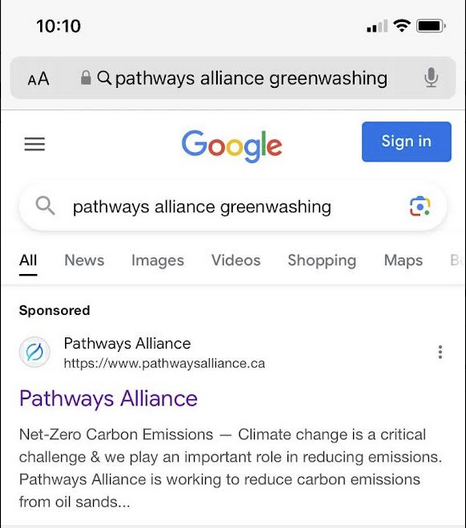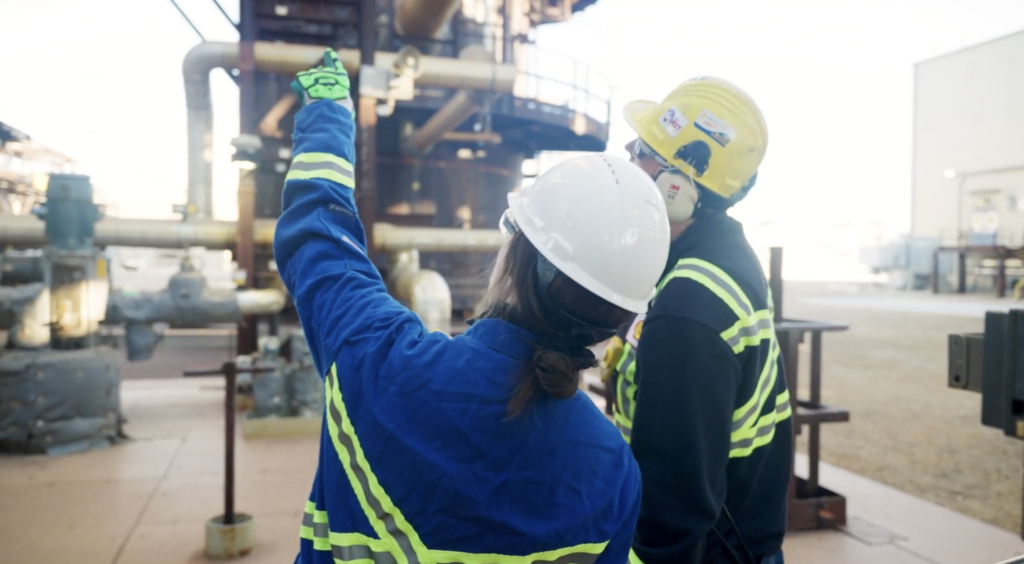A major Canadian oil sands group has been running advertisements on Google that target people seeking information about oil industry “greenwashing,” the practice by which companies make false and misleading environmental promises.
The Pathways Alliance is a marketing and lobbying organization representing the country’s six largest oil sands producers: Imperial Oil, Suncor, ConocoPhillips, Cenovus, CNRL and MEG.

Google ad records viewed by DeSmog show that it’s been paying to advertise on the search term “Pathways Alliance greenwashing,” meaning that when people type that phrase into Google, one of the first results that appears is the Pathways Alliance website.
“It’s part of their systematic attempt to influence the climate policy discussion,” Chris Russill, a Carleton University journalism professor and academic director of the climate communication centre Re:Climate, told DeSmog.
The Pathways Alliance is currently under investigation by the Competition Bureau of Canada due to a complaint from Greenpeace about the accuracy of its advertisements. Those ads, which have run in national newspapers, during hockey games and even on the sides of buses, portray oil sands companies as climate leaders “on the road to net zero,” when actually the industry is expanding its production of climate-altering crude oil to record high levels.
This is but one of “numerous indicators of greenwashing in Pathways Alliance’s public communication,” according to recent peer-viewed research from Russill and other academics in Canada and the U.S.
Their research, as well as the ongoing Competition Bureau investigation and a national ban on misleading fossil fuel advertising proposed by NDP member of Parliament Charlie Angus, have generated significant media attention this spring about the legitimacy of climate promises made by the Pathways Alliance.
But when Canadians went searching on Google for additional information about accusations of “greenwashing,” one of the top results they may have encountered was sponsored content from the Pathways Alliance claiming that the country’s biggest polluters “are working to reduce carbon emissions from oil sands.” (In fact, Canadian oil and gas emissions grew 13 percent last year, according to federal regulators, and are likely vastly underestimated in official counts).

It’s a potentially effective strategy, however, because “the links that show up first are the ones people use,” Russill said. “That’s why Google sells those spots.”
That might seem to contradict an ad policy adopted by Google in 2021 prohibiting climate disinformation, including “content that states a false claim as fact.” But when DeSmog reached out to the tech company, it concluded that the Pathways Alliance advertising doesn’t violate its policies.
“Our climate change policy prohibits ads from promoting false claims about the existence and causes of climate change,” a Google spokesperson wrote to DeSmog. “Ads intended to debate or promote green initiatives are permitted.” The Pathways Alliance didn’t respond to a media request.
This isn’t the first instance of oil sands companies using Google search to shape public perception about the industry’s environmental record. A DeSmog investigation revealed last year that the Pathways Alliance has advertised on search terms such as “how we can stop climate change,” “what is global warming,” “why is climate change important” and “government of canada climate change.”
“People search for this stuff for a variety of reasons. Schoolkids who are doing their homework. Cash-strapped farmers that want to understand the carbon tax. Voters interested in climate policy,” Russill said. “It’s really disappointing and problematic when you’re dealing with an oil sector that’s engaging in an influence operation at this scale.”
Subscribe to our newsletter
Stay up to date with DeSmog news and alerts







